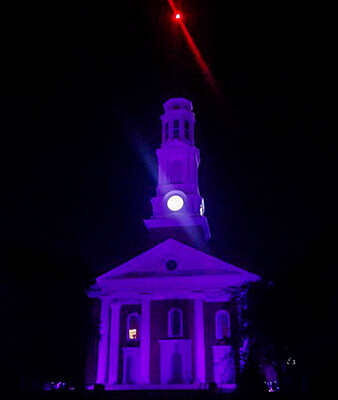- October 24, 2018
- By Colleen Crowley M.Jour. ’19
Memorial Chapel will be awash in purple, performers and guests will address relationship violence, and victims and survivors will be honored and remembered at tonight’s Purple Light Night on campus.
Campus Advocates Respond and Educate (CARE) to Stop Violence will host events and activities from 5 to 7 p.m. across campus to educate the public and call for an end to relationship violence as part of National Domestic Violence Awareness Month.
“The word ‘domestic’ really throws people off because they think you have to live together, or you have to be married or have children together,” says Carly Cottone, CARE outreach coordinator. “Casual [relationships] can still be abusive in nature, based on patterns of power and control and coercion.”
People ages 18 to 24 are at the highest risk of experiencing relationship violence, according to the National Coalition Against Domestic Violence. Cottone says emotional abuse, intimidation and stalking happen on college campuses—to men as well as women.
CARE to Stop Violence combats sexual and relationship violence, sexual assault, harassment and other unwanted behaviors through prevention and response. In addition to handling individual cases, the licensed professionals at CARE oversee and train students in peer advocacy, education and outreach. Cottone teaches a yearlong class in peer outreach, and her students are largely responsible for the new take on this year’s Purple Light Night.
In previous years, Purple Light Night included a series of speakers in a seminar–style presentation. This year, the event is reaching out to students with outdoor events across campus.
“We wanted more interactive activities so people could apply that information to real life,” says Shifali Mathews ’20, part of CARE’s peer outreach team.
At the Adele H. Stamp Student Union, the Survivor Garden will be rededicated in its new location near the southeast entrance of the union. (The garden is being shifted from the front of the University Health Center due to Purple Line construction, to avoid any disturbance to the area.)
At Memorial Chapel, performances and art displays will offer an outlet for students to express themselves and silent spaces will allow participants to honor and remember victims.
And on the steps of McKeldin Library, games, including giant Jenga, will get students actively involved in learning about relationship violence.
“It is uncomfortable and hard and difficult to talk about. But that’s why CARE is here,” says Cottone. “We are the survivor resource, we are the advocates, we’re there for the students, always.”
The services at CARE to Stop Violence are free and confidential. The office is located on the ground floor of the University Health Center and is open Monday through Friday, 9 a.m. to 5 p.m. For all other times, the crisis cell number is 301. 741.3442.
Topics
Campus & Community